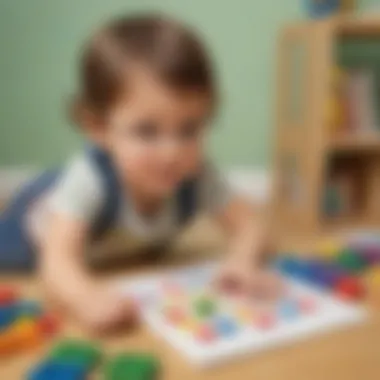Unveiling the Significance of Early Math Education for Preschoolers


Science Fun Facts
Mathematics, especially for preschoolers, holds a world of wonders waiting to be explored. Did you know that early exposure to math concepts can significantly enhance cognitive development in young children? It's not just about numbers and counting but also about sparking curiosity and laying the foundation for critical thinking skills.
Preschoolers engaging with shapes, patterns, and sizes are essentially embarking on a journey of discovery that ignites their problem-solving abilities and analytical skills. Through simple activities like counting toy cars or sorting colorful blocks, these young learners are beginning to grasp fundamental mathematical principles in a fun and interactive manner.
Did you know that incorporating math into everyday activities can make learning more engaging and accessible for preschoolers? Whether it's measuring ingredients while baking cookies or counting steps while walking to the park, the opportunities to introduce math concepts are limitless. By integrating math seamlessly into daily routines, parents and caregivers can foster a positive attitude towards learning and set the stage for a lifelong love of numbers.
Discover the Wonders of Math
Mathematics is not just about numbers; it's a gateway to a world of boundless possibilities. By tapping into the inherent curiosity of preschoolers, caregivers can unveil the beauty of math through playful exploration and hands-on activities. From exploring shapes in the environment to identifying patterns in everyday objects, there are endless opportunities to make math come alive for young minds.
Educational videos and interactive tools can be invaluable resources in introducing math concepts to preschoolers. Through colorful visual aids and engaging animations, children can grasp abstract mathematical ideas in a tangible and exciting way. By incorporating multisensory experiences, caregivers can cater to varying learning styles and ensure that math remains accessible and enjoyable for all young learners.
Real-life applications of math are all around us, waiting to be discovered. Whether it's measuring ingredients in the kitchen, timing laps around the backyard, or counting petals on a flower, preschoolers can engage with math in meaningful ways that are both relevant and relatable. By showcasing the practicality of math in everyday scenarios, caregivers can demystify abstract concepts and show children how math shapes the world around them.
Math Quiz Time
Are you ready to put your math skills to the test? Engage in interactive quizzes and brain teasers designed to challenge and stimulate young minds. Multiple-choice questions and puzzles provide a fun and engaging way to reinforce key mathematical concepts while encouraging critical thinking and problem-solving skills. By gamifying the learning process, children can hone their math abilities in an entertaining and rewarding manner.
Explore Math Through Experiments
Get ready to roll up your sleeves and dive into the world of math through fun and educational experiments. From measuring volume with water displacement to creating geometric shapes with everyday objects, hands-on activities can bring mathematical concepts to life in a tangible way. With step-by-step instructions, a materials list, and safety tips at hand, caregivers can facilitate enriching learning experiences that spark curiosity and foster a deep understanding of mathematical principles.
Introduction
In a society shaped by numerical data and analytical thinking, the role of mathematics in early education stands as a pivotal foundation for young minds. The concept of introducing mathematical concepts at a preschool age serves as a beacon of cognitive development and sets the stage for a lifelong journey of problem-solving and logical discourse. This article embarks on a reflective journey to delve deep into the essence of infusing math into the minds of preschoolers, aiming to shed light on the transformative impact it bears on shaping future intellects.
Significance of Early Math Education
Building a Strong Foundation
At the core of early math education lies the essence of building a sturdy groundwork for young learners to navigate through the intricate realm of numerical concepts. This aspect undertakes the responsibility of instilling fundamental arithmetic operations and basic mathematical principles, nurturing a robust mathematical aptitude for young minds. The focus on Building a Strong Foundation harbors the essence of cultivating a deep-rooted understanding of mathematical principles, ensuring a solid base for future mathematical explorations. The distinctiveness of Building a Strong Foundation lies in its ability to foster a structured approach towards mathematical concepts, offering young learners a reliable framework to comprehend and unravel the mysteries of numbers, shapes, and patterns, a fundamental cornerstone in the domain of early math education.


Enhancing Cognitive Development
The journey of enhancing cognitive abilities through early math education serves as an expedition into the depths of logical reasoning and analytical thinking. This facet plays a pivotal role in sculpting young minds to embrace critical thinking skills and decision-making processes. The essence of Enhancing Cognitive Development embodies the essence of sharpening mental faculties and nurturing a profound intellect that thrives on mathematical challenges. The significance of this aspect lies in its capacity to ignite a cognitive spark within young learners, empowering them to decipher complex problems and unravel intricate mathematical puzzles with adeptness. While presenting a myriad of advantages in fostering cognitive growth, Enhancing Cognitive Development also poses the challenge of stimulating young minds to embrace numerical complexities, underscoring the importance of building resilience and persistence in tackling mathematical endeavors.
Objectives of the Article
Understanding the Benefits of Early Math Exposure
The pivotal objective of unraveling the benefits of early math exposure lies in illuminating the indelible impact of mathematical engagement on the cognitive landscape of young learners. This aspect delves deep into the enriching benefits of integrating math into the early education spectrum, emphasizing the cognitive enhancements and analytical prowess that stem from early mathematical exposure. The key characteristic of Understanding the Benefits of Early Math Exposure lies in its ability to unravel the transformative potential of incubating a mathematical mindset at a tender age, fostering a profound appreciation for numerical concepts and logical reasoning. While acclaimed for its instrumental role in shaping young intellects, this aspect is not without its challenges, beckoning educators and parents alike to tread the path of mathematical enlightenment with caution and diligence.
Exploring Fun Ways to Teach Math to Preschoolers
The intriguing exploration of infusing fun into the realm of mathematical pedagogy for preschoolers unveils a dynamic approach to engaging young minds with numerical concepts. This aspect sheds light on innovative techniques and playful strategies designed to captivate the interest of preschoolers and instill a passion for mathematical exploration. The core characteristic of Exploring Fun Ways to Teach Math to Preschoolers lies in its ability to fuse entertainment with education, creating a harmonious space where learning seamlessly intertwines with joy and curiosity. This unique feature not only enriches the learning experience for young learners but also paves the way for a symbiotic relationship between mathematical proficiency and playful engagement, laying the foundation for a lifelong love for numbers and problem-solving. Amidst its multitude of advantages, this aspect also poses the challenge of ensuring the balance between amusement and academic rigor, navigating the thin line between fostering enjoyment and maintaining educational efficacy in early math instruction.
Cognitive Development through Math
In this segment of our exploration, we delve into the crucial aspect of cognitive development through math for preschoolers. Understanding math at an early age plays a fundamental role in enhancing cognitive skills, paving the way for improved problem-solving abilities and logical reasoning. By introducing mathematical concepts to young minds, we stimulate their brain development, encouraging them to think critically and make informed decisions. Math acts as a catalyst for cognitive growth, fostering a deeper understanding of patterns, sequences, and relationships.
Enhancing Problem-Solving Skills
Critical Thinking
Critical thinking stands out as a cornerstone skill that contributes significantly to a child's problem-solving capabilities. It involves analyzing situations, evaluating information, and making reasoned judgments. Critical thinking nurtures a child's ability to think logically, identify patterns, and draw conclusions based on evidence. This skill equips preschoolers with the capacity to solve complex problems by approaching them systematically and methodically. Despite its challenges, critical thinking opens doors to new perspectives and innovative solutions.
Decision Making
Decision making is another vital component in honing problem-solving skills among preschoolers. It entails choosing the best course of action after considering various options and possible outcomes. Decision-making skills empower children to weigh consequences, assess risks, and make choices confidently. By fostering decision-making abilities early on, parents and educators enable children to navigate challenges effectively and develop a sense of responsibility. Mastering decision making enhances a child's confidence and self-reliance.
Promoting Logical Thinking
Pattern Recognition
Pattern recognition plays a critical role in promoting logical thinking in young learners. Recognizing patterns allows children to predict outcomes, spot similarities, and understand relationships between numerical elements. Developing this skill sharpens a child's ability to identify regularities in data, leading to a deeper comprehension of mathematical concepts. Through pattern recognition, preschoolers enhance their problem-solving proficiency and cultivate a strong foundation for advanced mathematical reasoning.


Sequencing
Sequencing is a fundamental skill that aids in organizing information in a logical order. Understanding sequences helps children grasp the concept of before and after, establishing a sense of continuity and progression. Sequencing activities enhance a child's memory, attention to detail, and ability to follow instructions. By mastering sequencing, preschoolers improve their comprehension skills, laying a solid groundwork for future mathematical pursuits.
Effective Strategies for Teaching Math
In the section focusing on effective strategies for teaching math, the aim is to explore various approaches that engage preschoolers in mathematical concepts. Understanding the importance of employing innovative methods in early math education is crucial for optimal cognitive development. By incorporating interactive and stimulating techniques, educators can enhance the learning experience and promote a deeper understanding of mathematical principles.
Incorporating Play-Based Learning
Play-based learning is a cornerstone in early childhood education, facilitating a hands-on and enjoyable approach to teaching math. Math games play a significant role in fostering a positive attitude towards numbers and problem-solving. These games not only make learning fun but also improve critical thinking skills by encouraging children to strategize and analyze different scenarios. Additionally, math games help in developing decision-making abilities through engaging gameplay and challenging tasks.
Math Games
Math games offer an interactive way for children to grasp mathematical concepts through play. With features like interactive challenges and rewards, these games enhance engagement and motivation in learning. Their unique feature lies in making abstract mathematical ideas more tangible and relatable to young learners, promoting a deeper understanding of numerical relationships and operations.
Sensory Activities
Sensory activities serve as a multisensory approach to math education, engaging children through their senses. By incorporating touch, sight, and movement, sensory activities provide a holistic learning experience that caters to different learning styles. These activities stimulate cognitive development and create lasting impressions of mathematical concepts, offering a hands-on and immersive way to explore numbers and shapes.
Utilizing Everyday Situations
Everyday situations present valuable opportunities to integrate math into a child's daily routine. Grocery shopping, for instance, can teach children about quantities, measurements, and budgeting. By involving children in shopping tasks, parents and educators can enhance their understanding of basic math concepts and real-life applications.
Grocery Shopping
Grocery shopping exposes children to practical math skills such as counting items, comparing prices, and understanding quantities. It offers a real-world context for learning mathematical operations and problem-solving skills. The unique feature of grocery shopping lies in its ability to make math relevant and functional in everyday life, helping preschoolers connect theoretical knowledge to practical scenarios.
Cooking Together
Cooking together provides an interactive platform for exploring math through measurement, fractions, and following recipes. It enhances children's understanding of mathematical concepts like addition, subtraction, and estimation. This hands-on experience not only reinforces numeracy skills but also promotes teamwork and communication while preparing delicious meals.
Encouraging Curiosity and Exploration


Encouraging curiosity and exploration through hands-on experiments and outdoor math adventures is essential for stimulating a child's interest in math. Engaging children in practical activities sparks creativity and promotes a growth mindset towards learning.
Hands-On Experiments
Hands-on experiments allow children to explore mathematical concepts through interactive activities. The key characteristic of hands-on experiments is their ability to foster a deeper understanding of abstract ideas by providing concrete examples. By conducting experiments, children can witness math in action and develop problem-solving skills through trial and error.
Outdoor Math Adventures
Outdoor math adventures offer a dynamic and immersive learning environment for children to apply math in real-world settings. Exploring nature, measuring distances, and identifying patterns outdoors not only reinforces mathematical concepts but also promotes physical activity and observation skills. The unique feature of outdoor math adventures lies in connecting math to the natural environment, encouraging children to appreciate the practicality and relevance of mathematical skills in everyday life.
Challenges and Solutions
In this expansive guide to Early Math Education for Preschoolers, delving into the segment of Challenges and Solutions serves as a pivotal element. Fully comprehending these challenges and offering effective solutions is crucial in ensuring a well-rounded understanding of the topic. Addressing the hurdles that may arise in teaching math to young children and providing practical solutions not only aids in overcoming obstacles but also enhances the learning experience overall. It is imperative to navigate through potential challenges with insightful strategies to foster a positive learning environment and facilitate cognitive development effectively.
Overcoming Math Anxiety
Positive Reinforcement
A key aspect within the realm of Overcoming Math Anxiety is the employment of Positive Reinforcement. This technique involves the use of affirmative actions or feedback to encourage desired behavior, thereby reinforcing a positive association with learning math. The essence of Positive Reinforcement lies in its ability to boost confidence, motivation, and engagement among preschoolers when faced with mathematical tasks. By acknowledging and rewarding efforts, whether big or small, children are more inclined to embrace challenges and exhibit a growth mindset. The unique feature of Positive Reinforcement is its power to create a supportive and conducive learning environment, fostering a sense of accomplishment and a willingness to persevere through mathematical difficulties.
Patience and Persistence
Another crucial component in combating Math Anxiety is the practice of Patience and Persistence. These qualities play a fundamental role in guiding children through the learning process, acknowledging that grasping mathematical concepts takes time and effort. Patience allows educators and caregivers to provide the necessary support and guidance without imposing undue pressure on young learners. Persistence emphasizes the importance of continuous practice and exploration, nurturing a resilient attitude towards problem-solving. By cultivating patience and fostering persistence, children develop resilience, adaptability, and a positive attitude towards overcoming challenges in math. The advantageous nature of Patience and Persistence lies in promoting a growth mindset, instilling a sense of self-assurance, and instigating a passion for learning mathematics.
Addressing Individual Learning Styles
In the landscape of teaching math to preschoolers, recognizing and accommodating different learning styles is paramount. Understanding the nuances of Visual Learners and Kinesthetic Learners enables educators to tailor their teaching methods to suit diverse individual preferences, optimizing the learning experience for each child. Visual Learners engage with information best through visual aids, such as charts, illustrations, and colors, enhancing comprehension and retention. By leveraging visuals, educators create a stimulating environment that caters to the specific needs of visual learners, promoting deeper engagement with mathematical concepts. On the other hand, Kinesthetic Learners thrive through hands-on activities, movements, and tactile experiences, allowing them to grasp mathematical principles by actively participating and experiencing the lessons. By incorporating kinesthetic elements into math lessons, educators tap into the kinetic intelligence of these learners, fostering a dynamic and interactive learning environment. Both approaches, tailored to Visual and Kinesthetic Learners, present unique advantages in engaging children effectively, promoting understanding, retention, and enthusiasm for learning math.
Conclusion
Embracing the Journey of Math Learning
Continuous Support
In the realm of math education for preschoolers, Continuous Support stands out as a fundamental element essential for nurturing a child's mathematical journey. This aspect emphasizes the consistent assistance, encouragement, and guidance provided to young learners throughout their math learning process. A key characteristic of Continuous Support is its unwavering presence, ensuring that children receive ongoing help and reinforcement to grasp math concepts effectively. This holistic approach not only aids in consolidating their understanding but also fosters a sense of confidence and motivation in tackling mathematical challenges.
Celebrating Achievements
Within the context of math education for preschoolers, Celebrating Achievements holds a crucial role in reinforcing positive learning experiences. This aspect revolves around acknowledging and applauding children's progress, no matter how small, to boost their self-esteem and enthusiasm towards math. A standout quality of Celebrating Achievements is its ability to cultivate a growth mindset by highlighting the value of effort and improvement over mere outcomes. By celebrating milestones and successes, children are inspired to persist in their learning journey, instilling a sense of pride and satisfaction in their mathematical accomplishments.







